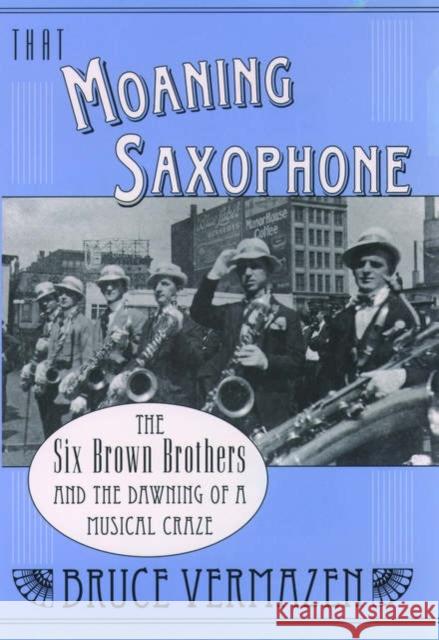That Moaning Saxophone: The Six Brown Brothers and the Dawning of a Musical Craze » książka
topmenu
That Moaning Saxophone: The Six Brown Brothers and the Dawning of a Musical Craze
ISBN-13: 9780195165920 / Angielski / Twarda / 2004 / 292 str.
That Moaning Saxophone: The Six Brown Brothers and the Dawning of a Musical Craze
ISBN-13: 9780195165920 / Angielski / Twarda / 2004 / 292 str.
cena 355,34
(netto: 338,42 VAT: 5%)
Najniższa cena z 30 dni: 344,46
(netto: 338,42 VAT: 5%)
Najniższa cena z 30 dni: 344,46
Termin realizacji zamówienia:
ok. 30 dni roboczych
Bez gwarancji dostawy przed świętami
ok. 30 dni roboczych
Bez gwarancji dostawy przed świętami
Darmowa dostawa!
Today, the saxophone is an emblem of "cool" and the instrument most closely associated with jazz. Yet not long ago it was derided as the "Siren of Satan," and it was largely ignored in the United States for well over half a century after its invention. When it was first widely heard, it was often viewed as a novelty noisemaker, not a real musical instrument. In only a few short years, however, saxophones appeared in music shops across America and became one of the most important instrumental voices. How did the saxophone get from comic to cool?
Bandleader Tom Brown claimed that it was his saxophone sextet, the Six Brown Brothers, who inaugurated the craze. While this boast was perhaps more myth than reality, the group was indisputably one of the most famous musical acts on stage in the early twentieth century. Starting in traveling circuses, small-time vaudeville, and minstrel shows, the group trekked across the United States and Europe, bringing this new sound to the American public. Through their live performances and groundbreaking recordings--the first discs of a saxophone ensemble in general circulation--the Six Brown Brothers played a crucial role in making this new instrument familiar to and loved by a wide audience. In That Moaning Saxophone, author and cornet player Bruce Vermazen sifts fact from legend in this craze and tells the remarkable story of these six musical brothers--William, Tom, Alec, Percy, Vern, and Fred. Vermazen traces the brothers' path through minstrelsy, the circus, burlesque, vaudeville, and Broadway musical comedy. Cleverly weaving together biographical details and the context of the burgeoning entertainment business, the author draws fascinating portraits of the pre-jazz world of American popular music, the theatrical climate of the period, and the long, slow death of vaudeville. Delving into the career of one of the key popularizers of the saxophone, That Moaning Saxophone not only illuminates the history of this novel instrument, but also offers a witty and vivid portrayal of these forgotten musical worlds.










